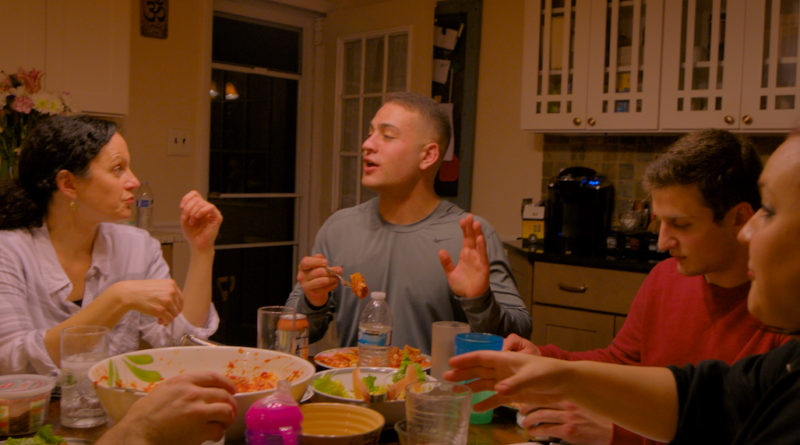INTERVIEW: ‘Our American Family’ examines impacts of generational addiction
Photo: Our American Family looks at the struggles of a family in Philadelphia dealing with generational addiction. Photo courtesy of the WFF / Provided by EG PR with permission.
The new documentary Our American Family, which is set to premiere at the Woodstock Film Festival this weekend, tells the difficult story of generational addiction in one Philadelphia family. As the tagline for the film promises, this movie has “No experts. No drug use. No melodrama.” Instead, it’s a visceral look at five family members trying to overcome the odds and break their family’s shared trajectory.
At its heart, Our American Family is a documentation of the struggle of addiction and how difficult it can be to break from that vicious cycle. That said, this family gives it their all to overcome those obstacles and find peace on the other side.
The film, directed by Hallee Adelman and Sean King O’Grady, will play Saturday, Oct. 2 at 3:45 p.m. at the Bearsville Theater in Woodstock, New York (an additional screening is set for Sunday, Oct. 3 at the Orpheum Theatre Saugerties). Recently Adelman exchanged emails with Hollywood Soapbox about her experience documenting this family. Questions and answers have been slightly edited for style.
How did you find this family, and what was the process like to win their trust?
I live in the same township as the members of Our American Family. Years ago, the mother in our film, Linda, heard that I was doing research for a novel, in which one of two siblings struggled with substance abuse disorder. Linda suggested that I speak with two of her children, Nicole and Stephen. Our American Family was born years later out of their family’s desire to help other families. We already had a relationship built on trust and respect, and our crew was thoughtful and caring. As my co-director Sean King O’Grady has said, “We truly became an extended part of the family.”
With such delicate subject material, how did ensure the film didn’t exploit their stories?
Linda, the mother in our film, often talks about the unfortunate “masks” that families have to wear to hide themselves, to avoid shame, to “pretend” that life is not riddled with hard moments and real challenges. This family’s bravery is real. The entire crew understood the delicate, but very important nature of this subject material. With Our American Family, our hopes have remained the same as the hopes of this family: to help other families feel less alone and to inspire compassion toward individuals and families struggling with addiction.
Do you believe this story has connections to many other families in the country?
In our country alone over 21 million people struggle with addiction, and so many of their family members struggle right beside them. In Our American Family the family fights against learned patterns and resentments, and works to make real shifts for their next generation. Whether a family’s struggle is connected to addiction or something else, we hope the viewers of Our American Family see that change is possible and that the work to maintain those hard-fought gains is ongoing.
How would you define generational addiction?
Our team defines generational addiction as the cycle of addiction or substance dependence that is transmitted from one generation to the next often as a result of genetics, temperamental traits (like impulsivity) or environment (like harsh parental discipline). …
What is the largest impediment to families or society in general from solving the addiction problem?
One of the largest impediments that families and society face with regards to addiction is stigma. Unfortunately, the fear of stigma keeps people silent. Out of all the millions of people struggling with addiction, the National Center for Drug Abuse Statistics reported that only 12.7 percent even talk about it. Many are afraid to reveal their dependence, even with their children. However, there is research that shows that if kids wait until they are past 17 years old to use illicit drugs, they are much less likely to develop a substance abuse disorder themselves. If we can bash stigma, more families can honestly discuss their own situations, more people could get support without fear of judgment or consequences.
Do you feel that the film works on multiple levels, depending on the personal circumstances of the audience member and their own family?
Audience members of Our American Family might connect to the question: Is change possible after years of entrenched patterns? However, they might also ask questions alongside the film family to explore: What [is it] like for a stepfather who walked into a tough family situation? How does it feel to hold deep resentments toward a sibling or child? Is it OK to brush off your own needs to ease your family’s burden? What is the fine line between love and enabling? We hope viewers feel a part of Our American Family, but also reflect on takeaways that are important for themselves, their families or other people they know. Even if they don’t have a personal connection to addiction, perhaps they will be better able to understand and show compassion for the struggles that their waitress, doctor, friend’s child or neighbor might be dealing with at home.
By John Soltes / Publisher / John@HollywoodSoapbox.com
Our American Family will screen Saturday, Oct. 2 and Sunday, Oct. 3 at the Woodstock Film Festival in Woodstock, New York. Click here for more information and tickets. For more information on these important issues: U.S. Department of Health & Human Services | Substance Abuse and Mental Health Service Administration (SAMHSA).

